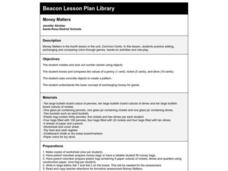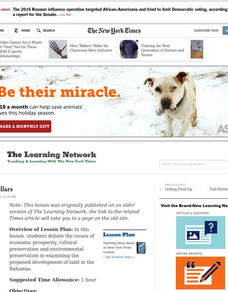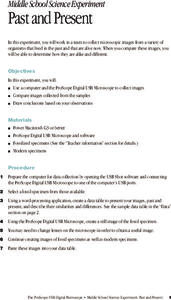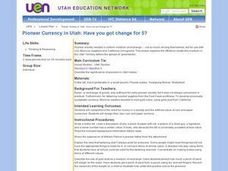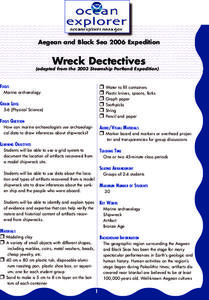Curated OER
Money Matters
Students play a game called Money Matters using cut out representatives of pennies, nickels, and dimes.
Curated OER
Sand Dollars
Students debate the issues of economic prosperity, cultural preservation and environmental preservation by examining the development of land in the Bahamas.
Curated OER
Past and Present
Students compare fossilized specimens to contemporary specimens. They use a computer and a Proscope Digital USB Microscope to collect and compare images of ferns, sand dollars and sow bugs to those of similar fossilized samples.
Curated OER
Pioneer Currency in Utah: Have you got change for a 5?
Students explore the need for money in a society and the artificial value of coin and paper currencies. They design their own coin and paper currency.
Curated OER
Pioneer Currency in Utah: Have you got change for 5?
Eleventh graders examine why pioneer society needed a uniform medium of exchange -- not so much among themselves, but for use with non-Mormon suppliers and California immigrants.
Laboratory for Atmospheric and Space Physics
A Classroom Solar System
Create a scaled model of our solar system in your classroom! Scholars work collaboratively to build paper mache planets and hang them in their proper position to showcase each planet's location in the solar system.
Curated OER
Sounds Like Science- Bottle Organ
Learners investigate the relationship between pitches and notes. In this musical pitches and notes lesson, students use different sized bottles, water, and sugar to demonstrate different sounds. Learners create musical notes.
Curated OER
Invertebrate Vocabulary-- Marine Invertebrate Match
In this science worksheet, students study 12 vocabulary words which pertain to marine invertebrates. Students read the definitions which include pronunciation, part of speech and meaning of the name. Students then look at 16 organisms...
Curated OER
Symmetry
Students explore symmetry. In this geometry lesson, student identify and define bilateral symmetry, radial symmetry, pentagonal symmetry, hexagonal symmetry, and cubic symmetry. Students construct examples of these types of symmetry and...
Curated OER
Fossil History
Learners examine the similarities and differences between living organisms and fossils. In this fossil activity students reenact the process of creating a fossil.
Safe Drinking Water Foundation
To Filter or Not to Filter
Drinking clean water can be taken for granted. Explore the process and high cost of filtering water with a water pollution and filtration activity. Young scientist build a filtration system to filter polluted water, examine the economics...
Curated OER
Exploring Magnets and Magnetism
Here is a very good lesson on magnets, magnetism, and magnitic fields that is chock full of great activities for you to implement with your young scientists. Learners discover the properties of magnets, look at the forces of attraction...
Curated OER
Can Young Children Distinguish Between Living and Non-living Things?
What does it mean to be living? Help your young scientists identify living and non-living things as a result of their learning through discovery. Observation of and interaction with a set of natural phenomena in their community will make...
Curated OER
Inside-out Adaptations
Students describe sea stars adaptations and explain how these enable them to survive in different environments. For this animal adaptation lesson students watch a video, get into groups and create a list of characteristics of sea stars.
Curated OER
Comparing and Contrasting
Learners practice compare and contrast skills. In this science and language development lesson, students complete a T chart generating traits of a snail and a clam. Learners complete a related worksheet.
Curated OER
Leaves, Flowers, Seashells, Mirrors and Symmetry
Students develop an understanding of patterns and symmetry. In this symmetry and pattern lesson, students use real world patterns then analyze and extend them. Students also use real world items while discovering and observing symmetry.
Curated OER
Wreck Detectives
Junior archaeologists examine types of artifacts from the Bronze Age on the internet. In collaborative groups, they create a story about a ship from this period and then construct a model of the ocean floor after their ship has sunk....
Curated OER
Wreck Detectives
Students investigate shipwrecks. In this marine archaeology lesson ,students collect data and make inferences about the causes of shipwrecks. Students work in groups to create their own model of a shipwreck using clay. Students then...
Curated OER
Sounds Like Science - Bottle Organ
Students see that by manipulating sound we can arrange a series of notes referred to as a musical scale. They explain the relationship between pitches and notes. They compare the sounds of different-sized bottles.
Curated OER
Introduction To Solving Equations
Use manipulatives (film cans and balance scales) to visualize and solve equivalent equations with your math class. After a lecture/demo, they utilize handouts and solve various equations using the methods learned.
Curated OER
Oddball Out: Shells
In this problem solving worksheet, young scholars analyze a row of pictures of various shells to determine which creature is different from the others pictured.
Curated OER
Factors affecting infiltration and runoff
Young scholars investigate some of the factors that determine the amount of runoff. They are reminded that infiltration and runoff tend to work oppositely. When conditions are bad for infiltration they usually lead to runoff.
Curated OER
Dig It Up
Students participate in an archaeological excavation to determine how archeologists make inferences about various cultures. They reconstruct the site using layers of drawings. They discuss the kinds of information they learned.
Curated OER
"Kermit the Hermit," by Bill Peet
Students read a story about making decisions to spend and save. They fill in missing words in a poem about spending.


